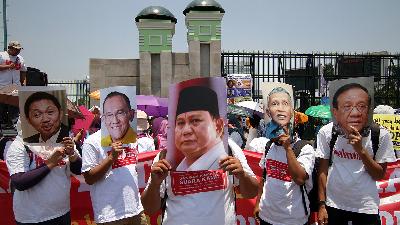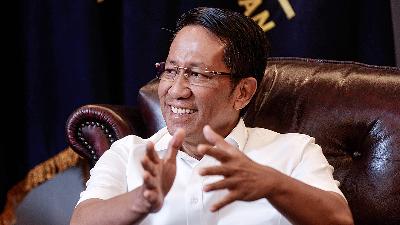A Gloomy Future for the Anti-Corruption Commission
Monday, December 23, 2024
The potential for conflicts of interest is overshadowing the new leadership of the KPK. The process is prone to external intervention.
arsip tempo : 174564319626.

IT is difficult to hope that the composition of the new leadership of the Corruption Eradication Commission (KPK) will result in improvements for the anti-graft body. The domination of law enforcement officials means that it is vulnerable to pressure from outside, which ends in major cases vanishing before they are properly investigated.
President Prabowo Subianto has appointed the five members of the key KPK leadership for the 2024-2029 term. Those who were appointed through the selection process under Joko Widodo are Setyo Budiyanto, Fitroh Rohcahyanto, Johanis Tanak, Ibnu Basuki Widodo, and Agus Joko Pramono.
The composition of the new commissioners is also different from the previous period because many of them are ‘representatives’ of other law enforcement agencies. Setyo Budiyanto, who has been elected KPK Chair, is a three-star police general who was previously Inspector-General at the Agriculture Ministry. Two other commissioners, Fitroh Rohcahyanto and Johanis Tanak, are from the Attorney General’s Office (AGO), while Ibnu Basuki Widodo is a judge and Agus Joko Pramono is a former Deputy Head of the Supreme Audit Agency (BPK).
The dominance of representatives from law enforcement agencies is strange and could lead to many questions, especially since one of the reasons for the establishment of the KPK is the fact that the eradication of corruption often came to a halt within the police and the prosecution service. As a result, when representatives from the police, the AGO and other state institutions dominate the structure of the leadership, people might suspect that this is a plan to take over the KPK in order to safeguard their own institutions.
The lack of commissioners from the civil sector, such as activists and lawyers, also means there will be minimal control over the KPK leadership. This means that the KPK moves even further away from civil society, and as a result, issues relating to the eradication of corruption will be solely in the hands of the elite.
The outlook for the eradication of corruption under these five new leaders is even more gloomy if we consider their track records to date. Johanis Tanak, who was a commissioner in the previous term, faced an ethics hearing in 2023 for communicating with an individual being investigated by the KPK. Ibnu Basuki Widodo acquitted a defendant accused of corruption relating to the supply of science laboratory equipment to Islamic boarding schools at the Ministry of Religious Affairs. Meanwhile, the name of Agus Joko Pramono was mentioned by Benny Tjokrosaputro, convicted over the Asuransi Jiwasraya corruption case, for allegedly protecting a particular group when the BPK calculated the losses to the state.
It is certain that Setyo Budiyanto will continue the domination of police personnel at the KPK, which was previously led by Comr. Gen. (ret) Firli Bahuri, also from the police. The same is true for Fitroh Rohcahyanto, who will tighten the grip of the AGO on the KPK. In the past, a number of police officers and AGO officials, as well as judges and BPK auditors, were detained by the KPK for taking bribes.
The significant potential for conflicts of interest among the KPK leadership will also have an impact on the resolution of major cases still under investigation by the organization. For example, there is the alleged corruption case in which former South Kalimantan Governor Sahbirin Noor is embroiled. After Sahbirin won a pre-trial hearing, the KPK did not once again name him a suspect even though it had strong evidence. The same happened with Deputy Justice Minister Edward Omar Sharif Hiariej, who was caught up in a case involving bribes of Rp8 billion paid by Helmut Setiawan, former Chief Executive Officer of Citra Lampia Mandiri.
The latest case is the alleged embezzlement of Bank Indonesia social program funds, which it appears became a cash cow for members of the 2019-2024 House of Representatives’ Finance and Banking Commission. The legal process, which began smoothly, suddenly began to go off the rails because it dragged in several politicians from parties in the coalition supporting the government.
These major cases will only be completely solved by the leadership of an anti-corruption commission that is independent and ready to resist intervention from outsiders, not by those with a significant potential for conflicts of interest.











